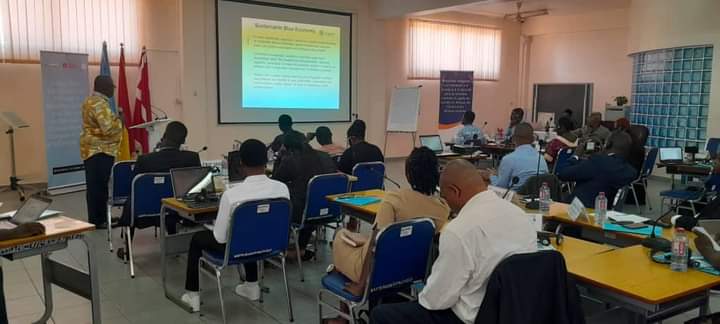By Kemo Cham in Accra
The last two years has witnessed a decline in incidents of piracy in the Gulf of Guinea (GoG), but crimes at sea still pose a major threat to the realization of the huge potential in Africa’s blue economy, maritime experts say.
The experts from the Kofi Annan International Peacekeeping Training Centre (KAIPTC) in Accra, Ghana said criminals who terrorize the region at sea are seeking new frontlines in the face of concerted regional efforts against their activities. The Central Africa region is said to be the most popular destination of these gangs.
“The steady decline in maritime piracy has been as a result of concerted efforts by national authorities, particularly the Nigerian state, with the support of regional and international partners; regular deployment of naval assets by international partners; and piracy convictions in Nigeria and Togo in 2021, among others,” says Air Commodore George Arko-Dadzie, Deputy Commandant at the KAIPTC
Data attributed to the International Maritime Bureau show that cases of piracy have reduced from 123 incidents in 2020 to 14 in the first 6 months of 2023. Ten of these cases are armed robbery at sea cases.
The Gulf of Guinea, a stretch of geographic region covering 26 countries between Western and Central Africa, is said to hold a vast wealth of marine resources and oil deposits.
Due to its wealth of natural harbours, the route is also a favourite for many shipping companies.
According to experts, Africa’s ocean resources, also known as the blue economy, has a potential to contribute an estimated US$300 billion to its economy, and the Gulf of Guinea is a major part of that. But the continent’s inability to prevent maritime crimes is presenting it from realizing this potential.
To change this situation, the media has a huge role to play, officials say. To this end, the KAIPTC is implementing a five-year project titled the “Integrated Responses to Threats to Maritime Safety and Security in the Gulf of Guinea Domain,” whose goal is to establish a collaborative platform among stakeholders in the region’s maritime sector.
Some 25 media and communication practitioners from West Africa are undergoing a five-day training on reporting security as part of this effort. The training taking place at the KAIPTC in Accra is the second in a series of trainings, after a pilot phase convened in Takoradi, western region of Ghana last May.
“Our aim is to enhance the comprehension of the dynamic maritime security landscape, promote better coordination and cooperation, and leverage both individual and collective efforts to improve maritime security in the GoG,” Commodore Arko-Dadzie said in a statement at the opening ceremony in the Games Rooms of the Center.
The training attracted journalists and communications professionals from both civilian and military maritime institutions from Sierra Leone, Liberia, Cote d’Ivoire, Nigeria, Togo, Benin, Senegal and the host nation.
The participants are being taking through the concepts around the blue economny, media and maritime security reporting and the legal and policy frameworks on maritime security, among others.
The training also include field visits to maritime institutions.
Prof Kwesi Aning, Director of the Faculty of Academic Affairs and Research at KAIPTC, led the session on the Blue Economy in the first session of the training.
He noted that the role of the media in covering the maritime sector is very important as journalists play a critical role in communicating scientific advances.
“But even more crucially is he way that you influence opinions,” he said in the opening session.
Prof. Aning said the myriad of issues facing the GoG requires behavioural change that can be facilitated by journalists through proper communication. He said the oceans have become dumping ground for wastes like plastic and faecal matters which has to stop.
“The end results of negative practices is that the potential of the blue economy cannot be achieved if we don’t change our behaviour,” he said.






















